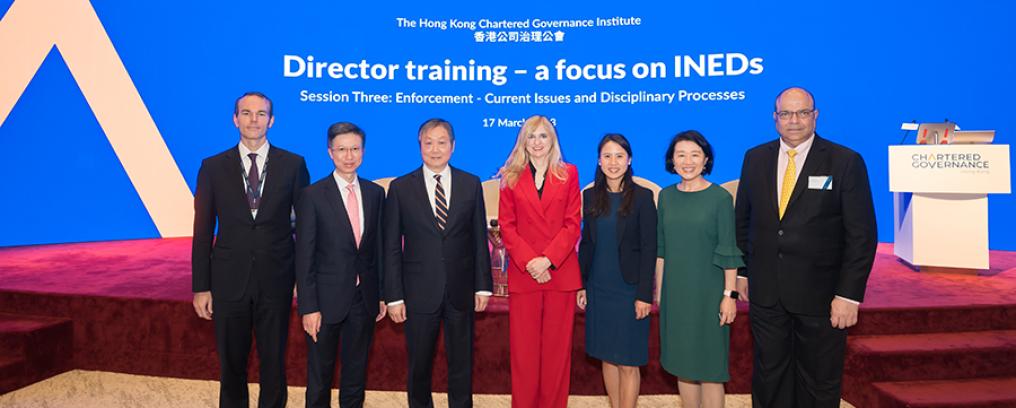In this concluding part of our interview with Dr Christine Chow, board member, International Corporate Governance Network, and Head of Active Ownership at Credit Suisse Asset Management, she talks about how the approaches to governance and sustainability are likely to evolve in the years ahead.
In the first part of this interview, published last month, we discussed how the main focus of the ESG movement has been on environmental aspects, but that there is likely to be an increased focus on social aspects in the future. What’s your view of how the ‘G’ aspect of ESG fits into all of this?
‘I don’t find the ESG acronym very useful – are we talking about the need for net-zero alignment? Are we talking about working conditions, health and safety or diversity and inclusion? As my friend Professor Fabrizio Ferraro stated in his conversation with Professor Alex Edmans, who published the provocative but well regarded paper, The End of ESG, ESG does not need a specialised term, as that implies it is niche. Considering long-term factors when valuing a company is not ESG investing; it’s just good practices in investing. We want great companies, not just companies that are great at ESG. Not all ESG factors improve long-term firm performance.
Similarly, the term biodiversity is very broad – are we talking about soil health, are we talking about the extinction of certain species? As my colleague, Dr Christoph Biehl, Senior Active Ownership Specialist, Credit Suisse Asset Management, has pointed out in the FAIRR Oceans and Biodiversity Impact Report, published in November 2022, “Companies with a dependency on natural capital, such as those in the food industry, should have an understanding of how this dependency may be affected by climate change. In this specific case, this could be the migration of fish due to changing sea conditions. Food producers are closely exposed to the double materiality of environmental degradation and should therefore be at the forefront of assessing and mitigating this risk”. In our recently published 2022 Active Ownership report, we further discussed different aspects of biodiversity by looking at distinct companies and their individual interactions with the biosphere.
Having said that, focusing exclusively on E&S is a very bad idea. Some of the biggest scandals that have brought the biggest harm to society and the biggest harm to investment value were caused by governance failures. If we look at the UK, its governance-related reports and Stewardship Code were induced by governance scandals, from the Robert Maxwell case in 1991 that led to the Cadbury report, Walker Report and the Kay review, to the impact of the 2008 Great Financial Crisis that gave us the 2012 UK Stewardship Code. So I think the ‘G’ should really be the top priority. Most of the people who have been in this industry for a long time would say that governance is always the most important because without improving governance processes and their effectiveness in practice, changes in E&S cannot be implemented well.
If companies focus only on, say, being aligned with the United Nations Sustainable Development Goals they are forgetting the elephant in the room. If governance issues are not addressed, for example if board oversight is not strong and directors do not speak up because there is no safe space to challenge ideas and the status quo, this may lay grounds for problems in the future.
Also, many issues that might come under the ‘E’ or the ‘S’ headings are also governance issues. In the UK, the Financial Conduct Authority (FCA) often focuses on the issue of culture in its discussion papers. For example, as the late Sir Win Bishoff said, “a healthy culture both protects and generates value. It is therefore important to have a continuous focus on culture, rather than wait for a crisis”. Sir Win sponsored the project on corporate culture, which led to the publication of Corporate Culture and The Role of Boards by the FCA in 2016.
Culture affects how people work together so it is an ‘S’ issue, but it is primarily a governance issue – culture is about having an atmosphere and processes in place where a board can challenge management when necessary, and colleagues that will speak up when they think things are not right. It is about ensuring the quality of implementation of policies and processes. Look at the Theranos example – the company had a lot of well-known people on its board, but did any of them raise the alarm about the ongoing fraud? Eventually, it was a brave whistleblower who uncovered the wrongdoings.
In fact, we should not forget about governance and what good governance really means – this is about more than tick-the-box compliance. An independent board of directors is crucial to the economic success of a company. Business strategies need adjusting more often these days in response to rapidly changing circumstances, and therefore changes to the executive board occur more frequently than in the past. Hence, ensuring the board, especially the audit and compensation committees, are independent and effective is of vital importance. Investors appreciate the opportunity to vote on compensation for the board and the executive management team. Europe is advanced in compensation governance matters, with regulatory-mandated binding votes on executive and, depending on the market, also on director remuneration. Companies in Asia can benefit from such best practices.’
Is the Theranos example also a warning to company secretaries and governance professionals who are responsible for supplying directors with the information they need to make the right decisions?
‘Yes, but board members can't just rely on what is being presented to them in the boardroom. They need to have alternative channels of information if they want to do the job properly. This is particularly important for independent board directors as they do not have executive responsibilities in a company. They should conduct their own due diligence, such as shop visits, if the company is in the consumer sector, or visit a bank branch and speak to frontline staff when they can, so that they can get a real sense of the culture and workforce sentiment.
I appreciate that not all sectors provide directors with the opportunity to conduct such due diligence – many sustainability-related risks come from the value chain, for instance, in upstream suppliers and in downstream logistics. Directors may need insights from a range of venues and operations, from forests to mines and manufacturing operations. Hence, working with investor initiatives and supranational organisations that provide such access would be extremely valuable.
To give some examples, the OECD has organised mine site visits in the Democratic Republic of Congo; FAIRR, the investor collaboration initiative referenced above by my colleague Dr Biehl, has organised an aquaculture visit to the Nordics; and in April 2023, the Investor Policy Dialogue on Deforestation (IPDD) Initiative organised a delegation to Brazil to visit government representatives, companies and forests. There is no better way to understand a company and an issue than doing proper on-site due diligence, both planned and impromptu.’
In the first part of this interview you made the point that investors are looking for quality rather than quantity when it comes to corporate disclosures – could we revisit the issue of quality disclosure and materiality here?
‘Companies should not lose sight of what their indicators actually mean and what story they are trying to tell. Companies often put out a lot of data and indicators relating to diversity, equity and inclusion (DE&I). Sometimes such data looks good on paper but doesn’t actually represent any gain in relation to DE&I. Investors have noted the practice, for example, of changing the definition of seniority to improve a company’s gender diversity indicators in the top leadership. This tactical manipulation is a waste of resources and is really an indicator of bad culture.
At Credit Suisse Asset Management, we are working with peers to come up with a list of social indicators that reflect financial materiality to a company, as well as impact on employees or the society. We are providing collaborative feedback to the European Financial Reporting Advisory Group to support the development of consistent and transparent indicators. We have leveraged our experience engaging with companies as we have developed a bespoke questionnaire that focuses on a range of relevant material factors specific to funds’ characteristics.’
Would switching to an outcomes-based approach be solution to this?
‘This is the direction of travel, as noted in the UK Stewardship Code 2020 and the latest Guidance for Pursuing Impact in Listed Companies published by the Global Impact Investing Network, but the definition of the desired outcomes needs to be a lot smarter. For example, how do you choose what staff training is appropriate and how do you measure the return on investment in this training? What do you expect as a change of behaviour, or as an improvement in efficiency? If you cannot measure what you are expecting in terms of change post-training, you are wasting people's time and company resources.’
Do you expect to see regulatory regimes globally take an increasingly outcomes-based approach?
‘Regulations are there to drive a change in outcomes and a change in behaviour – they were never intended to encourage compliance in name but not in spirit. Any regulator or standard setter will tell you that the regulations are a form of guidance to help raise standards.
But we should also bear in mind that, while the narrative and expectation is to drive a change in behaviour, regulations and standards are building blocks. If you asked me whether the SASB indicators are enough to set a company’s own indicators, I would say no because they're quite basic. So we need companies to add layers of explanation on top of the basic set of indicators – they need to tell their story based on their business model. It has always been about the story and the business model. Companies, whether public, private or start-up, are trying to sell investors their story about how to be a successful company. The indicators provide the data and information to back this up.’
Regulators in Hong Kong have made it clear that they intend to align the local regulatory regime with international standards – in particular those of the International Sustainability Standards Board (ISSB). Do you think this will result in a steep learning curve, for example for companies not yet reporting on their Scope 3 greenhouse gas (GHG) emissions?
‘The ISSB announced in December 2022 that Scope 3 will be on the agenda. You can find a short video about this online as, after every board meeting, ISSB discloses the key outcomes online. This is sending out a really good message – it's not about the fact that the board had six hours of meetings, it's about the major decisions the board made during those meetings.
Coming back to Scope 3, while this will be a requirement, there will be some exemptions to the reporting requirements in the first year. The idea is to incentivise progress – no one is ever perfect and the definition of perfection keeps changing anyway.
One of the things my horse-riding has taught me is that the pursuit of perfection reflects the growth mindset of a company.
Investors have more confidence that problems will get addressed if a company has a growth mindset. They are looking for companies that may not be perfect today, that may never be perfect, but that just want to do better. So they are looking for evidence that the executives are not afraid of running towards problems to address them before they become big issues, rather than sweeping them under the carpet.
That is why, in engagement, we often ask situational questions – how would you handle this scenario? How do you address conflicts of interest? If executives are uncomfortable talking about conflicts, that is a problem for me. If they cannot acknowledge these issues, how are they going to get their staff to escalate problematic issues to make sure they are addressed.’
What’s your view of the current controversy surrounding carbon credits?
‘I think we need to approach carbon credits with caution, especially the voluntary carbon market. You've probably seen the criticisms around how carbon credits are calculated. We need to be cautious about the mechanism and methodology used to certify carbon credits, but I don't think we should ignore them. They are a way of providing natural assets with a proper price in the world. Without trustworthy carbon credits it would be harder to protect natural resources because there would not be enough value being put on them.’
Lastly, can you tell us about developments in your own career – in particular your work as Convenor of the Sustainability and Climate Action Task Force set up by the Accounting and Financial Reporting Council (AFRC) here in Hong Kong?
‘The task force is composed of a diverse group of people. Even though I'm from Hong Kong, I hope to bring more of a global perspective to the discussions, making sure of course that it is applicable to Hong Kong and, in a broader context, Greater China.
When the task force members were appointed, we were asked to do a blue sky study of what is needed to support Hong Kong to continue as a financial centre through the climate lens, but also looking at broader sustainability issues. This will of course be partly about the impact of the ISSB standards, which I think will be an important part of encouraging sustainability integration.
The task force had monthly meetings last year, sometimes inviting experts from Hong Kong and around the world to speak to us – including regulators, standard setters and independent industry experts. We've come up with a report and our recommendations are under review by the AFRC.’
Could you also update us on your work as a board member of ICGN?
‘ICGN was established after the Cadbury review in the UK and was one of the first governance networks with a global remit. It has done a fantastic job as a platform for a global dialogue on governance. We try to make it as globally relevant as possible and we are always learning about what has worked in different jurisdictions. Our recent conference in Stockholm is a good example of that. While ICGN advocates one share one vote, one of the issues discussed at the conference was how Sweden has made dual-class shares work.
So it's very much a learning organisation with a learning culture that is open to ideas. We are making a conscious effort to encourage young sustainability and governance professionals to join us and to share their perspectives about the future of our industry. For example, in 2021, we established the Rising Star Awards to explicitly acknowledge the industry-leading work of promising young talent. I feel very privileged to be working with ICGN and will continue to contribute by bringing the Asian perspective to the global audience and the global perspective to the local audience, which is what I hope to achieve at the AFRC as well.’
Dr Christine Chow was interviewed by CGj Editor Kieran Colvert. The first part of this interview was published in the May edition of this journal and is available via the CGj website: https://cgj.hkcgi.org.hk.



